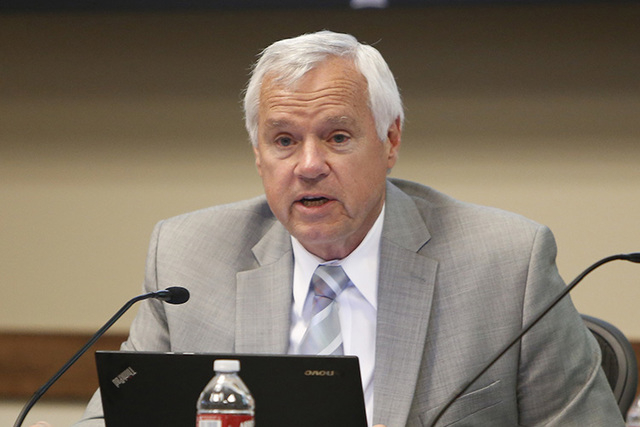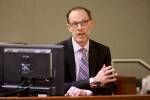Emails show Nevada higher ed agency misled Legislature on funding study
Nevada System of Higher Education officials actively worked to undermine the Legislature’s effort to overhaul college and university funding models in recent years, going so far as to present a false document to lawmakers and joking about it afterward, emails obtained by the Las Vegas Review-Journal show.
Using the state public records act, the Review-Journal accessed hundreds of pages of emails sent to and from state higher education officials between November 2011 and September 2012. The documents offer an unvarnished glimpse into a state agency often accused of being averse to change and intentionally opaque. The Nevada System of Higher Education oversees all of Nevada’s state-supported higher education, encompassing eight institutions.
The emails were sent at a time when the stakes were about as high as they get in Nevada higher education and a lot of money and power was on the line. A 2012 interim legislative committee was studying the state’s funding formula, which had long been criticized as unfair and nearly impossible to understand.
The chairman of that committee, former state Senate majority leader Steven Horsford, said the emails clearly show NSHE officials gamed the effort. Horsford, who left politics after losing a bid for re-election to Congress in 2014, said the system’s total disregard for the policy-making process needs to be exposed.
“Legislatures can’t legislate, the governor can’t govern, when these are the types of antics being played,” Horsford said after the Review-Journal sent him copies of emails and read others to him over the phone. “If this shows anything, it shows that the Legislature is not in charge. If anything they’re being used as tools. That has to change.”
But NSHE Chancellor Dan Klaich said in a statement that the emails “reveal the intense and detailed work on my part, NSHE staff and its institutions in developing a funding formula proposal that would address, as fairly and equitably as possible, the diverse needs of the institutions and the students.”
He said the Review-Journal is “trying to misconstrue the information by selectively taking quotes out of context and these frank and honest emails, and at times some light-hearted exchanges …”
DRIVING THE AGENDA
As Horsford’s interim legislative committee set to work on November 29, 2011, higher education system officials began strategizing how best to control the study process.
On December 10, 2011, Klaich emailed researchers at Colorado-based National Center for Higher Education Management Systems asking for help. Klaich explained that after one meeting he felt Horsford’s committee lacked leadership, creating an opportunity to “drive the agenda.”
Klaich referred to the think tank as his “special consultant” in a message to his confidante, Jane Nichols, who was herself a former chancellor who still worked in the system in a different role. Nichols advised him that the system should “have the ideal outcome of our formula study in our hip pocket.”
Committee members were told the consultant was an impartial resource when in fact the system wielded overwhelming influence over its research, emails show. In one message, Klaich thanked researchers for giving him “ammo” in his fight.
So close was the relationship that the think tank let system officials write a memo under NCHEMS letterhead.
“I will just figure out what you would say and put it on your letterhead :)” Klaich wrote former NCHEMS President Dennis Jones in August 2012.
“Make the bill a big ‘un.” Jones replied.
“I assure you it will be worth your time,” Klaich responded, following a day later with a message telling Jones he was indeed working on that “big ‘un.”
Emails show Klaich and others in his agency wrote and circulated among themselves multiple versions of a memo on the think tank’s letterhead that was later purportedly sent to Klaich by Jones. The memo was styled as the think tank’s response to questions raised by the committee and it directed Klaich to share the response with the committee. It followed a particularly hostile committee meeting where Horsford had complained that neither the committee’s consultant nor the Legislature’s fiscal staff could determine how NCHEMS calculated its recommendations.
The online discussion between higher education officials shows they were sometimes unsure why they were arguing for a particular point, but it didn’t really matter.
In one email concerning the false memo, Crystal Abba, vice chancellor for academic and student affairs, wrote that she didn’t think anyone had a good answer about why they’d used certain methodology to reach a desired conclusion. To obscure that weakness, she suggested having NCHEMS write, “This is the same basic architecture recommended for Nevada because it is simple, transparent, and easy to understand.”
“Not stellar, but it’s something.” Abba acknowledged to her coworkers.
Keeping the Legislature in the dark about who was really producing the studies and documents presented to the committee was also a concern.
“It won’t seem credible coming from us,” Renee Yackira, who was then a vice chancellor in the system, said in an email. She explained that she and fellow vice chancellor Constance Brooks felt it “would be very bad” if Klaich had to defend or even explain the document written in-house on NCHEMS letterhead.
Jones in a statement said he asked NSHE to write the memo because he was pressed for time, but that he reviewed the final version for accuracy. On the system’s input into his research as a whole, Jones said, “the chancellor, working with the presidents, made minor changes to the matrix which I deemed appropriate.”
But the emails show that in the contentious-build up to the committee’s final decision, Jones was more than a dispassionate researcher.
“Did God listen???? Or did the infidels claim the day???” Jones wrote in one message.
The Nevada higher education system’s relationship with NCHEMS has been an issue in the past. In 2015 the Review-Journal reported that the think tank had buried a negative assessment of the system after officials expressed fear it would be used to “bludgeon” the agency at a time when a legislative committee was studying whether to break up the agency.
“What type of influence was applied during the funding formula?” Regent Mark Doubrava asked at the time. “It’s almost like there is a serious issue of bringing in consultants to have the appearance of getting outside information, have a dog-and-pony show and the chancellor knows the facts ahead of time anyway, so that’s what’s applied.”
But the regents didn’t probe to see if there was a pattern. Instead, an attorney was hired to investigate only the incident with the buried report. That investigation found Klaich had feared the report could cost him his job, but that researchers had softened findings on their own.
The investigation concluded Klaich had done nothing wrong.
Horsford said he felt it was egregious if the system used state money to pay a think tank for work on the funding formula, then did the work itself.
State records show NCHEMS was paid $13,762, or 55 hours of work at $250 per hour.
Roland Stephen, a researcher with the Legislature’s consultant, SRI International, said the payment seemed low when compared with the volume of work NCHEMS appeared to have presented to the committee.
UNSATISFACTORY OUTCOME
In the end, the system was happy with the new funding formula, which was ratified by lawmakers in 2013.
But dissatisfaction with the formula remains high and many higher education leaders say the goal of creating a transparent and fair method to dole out funding fell flat. There’s a push from people concerned about community colleges to again take up the formula in the 2017 session.
While the University of Nevada, Las Vegas’ Lincy Institute concluded in 2014 that disparities legislators wanted to address remain a problem, Klaich in a statement last week said the Legislature had accomplished its goal of creating a more equitable formula.
Horsford disagrees.
“It’s appalling. It’s preposterous. It’s part of what’s wrong with the way the Nevada System works,” Horsford said. “The system came with an agenda, basically to protect the existing formula and the funding for the institutions, thereby thwarting our goal of creating a more equitable, fair and transparent formula.”
The involvement of NCHEMS — a group long associated with the state system — was controversial from the start. The Legislature wanted an independent researcher, and hired its own consultant through a bid process, rejecting an NCHEMS bid for that work.
When Klaich told the committee he had asked NCHEMS to give him a draft of a formula matrix to present to the committee, Horsford wanted to know more about the think tank and how it was affiliated with the system.
Klaich said a formal affiliation didn’t exist with the system, adding he had hired them in the past and considered them extremely knowledgeable.
Horsford later learned that Klaich had already signed an NCHEMS contract to work with his agency.
“That’s inappropriate and I think that out of respect for this process that needed to be put out there and made part of the official record,” Horsford said at an August 2012 committee meeting.
Klaich in a statement last week said NCHEMS’ involvement was no secret, and the committee was informed of it. He said there was a misunderstanding between himself and Horsford, but the confusion was unintentional.
Horsford said getting straight answers about the relationship between NCHEMS and the state agency was just one problem he faced. He said experts asked to testify before the committee kept backing out, saying the system told them not to appear.
“The system kept trying to advocate for the status quo and literally prevented individuals with different information, different perspectives from coming forward,” Horsford said.
Horsford said he wanted his committee to hear from presidents of all state institutions to represent the school’s different perspectives and needs, but the presidents told him they were afraid to give their opinions publicly.
Klaich has said there was plenty of debate within higher education circles, and that he issued what has been called a “gag order” telling college and university presidents to refrain from talking about the results and instead present a unified front only after Horsford’s committee wrapped up its work.
But emails show Klaich from the start wanted to control the presidents’ role in the debate from the beginning, demanding all contact with the committee go through him as a way to ensure a consistent message. He said he would allow some flexibility if lawmakers reached out to the presidents, so long as the presidents promptly reported any contact to him.
Last week Klaich wrote that he sought frank input from many interested parties and incorporated that input into a proposal that reflected a system-wide consensus.
Horsford said that emphasis on consensus made it impossible to publicly air differences between colleges and universities.
In a column in the Reno Gazette Journal last week two former northern community college presidents wrote that presidents who don’t fall in line with the system and go off-message risk being fired.
NSHE’s approach isn’t in line with the ethics higher education holds dear, said Teddi Fishman, director of the International Center for Academic Integrity, a multi-university group that fights cheating, plagiarism and academic dishonesty in higher education. No Nevada colleges or universities are listed as members of the group.
“If you have a good case to make you should be able to make it transparently, you shouldn’t have to obscure where your sources are coming,” Fishman said. Having a state agency present work it wrote as that of a think tank, going so far as to write a memo to itself, isn’t just a breach of academic integrity but the honesty most expect, she said.
Contact Bethany Barnes at bbarnes@reviewjournal.com or 702-477-3861. Find her on Twitter: @betsbarnes
RELATED
Nevada higher ed officials quashed report critical of their management
Regents plan investigation of Chancellor Klaich
Costly attorney retained to review chancellor's handling of report
Consultant clears higher ed chancellor of mishandling critical report




























